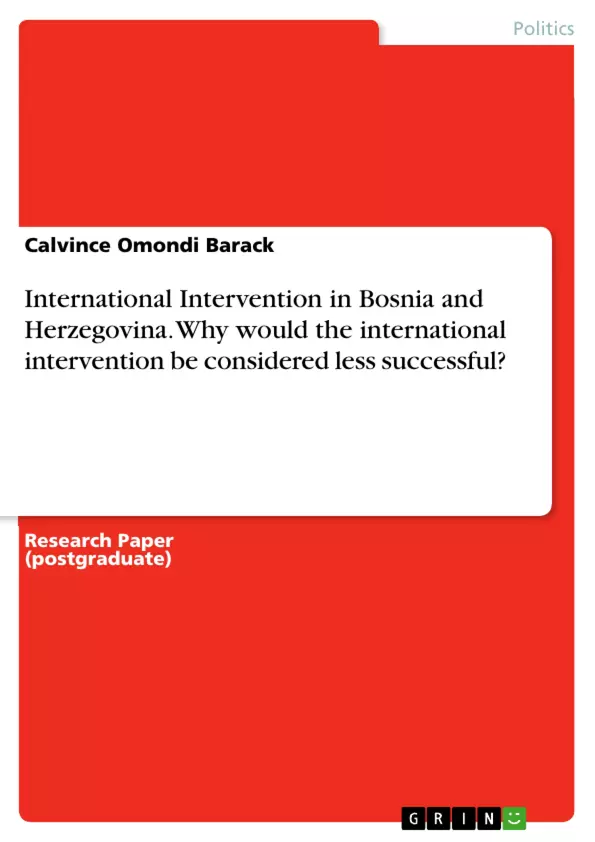This paper provides an overview of the conflict in Bosnia and Herzegovina and the international intervention in ending the conflict. It begins by tracing the origins of the conflict from the referendum of 29 February and 1 March of 1992 to the Srebrenica massacres. The failure by the international community to restore peace through the Lisbon and Vance-Owen peace plans through Srebrenica to finally Dayton has led to the question: Why would the international intervention in Bosnia and Herzegovina be considered less successful?
In answering this question the paper has used four hypothesis of; poor timing, incoherent approach, poor understanding of the conflict situation by the international community and the product of the intervention in the Dayton Peace Agreement and its implication on governance and prospects on EU accession. The paper after thorough discussion of the intervention along the four lines of hypothesis has concluded that the poor timing which goes with the mandate affected the intervention negatively, the lack of coherent approach led to continued commitment of atrocities with poor understanding of the conflict situation informing the division of the country into ethnic lines from Lisbon through to Dayton hence less successful.
Inhaltsverzeichnis (Table of Contents)
- Abstract
- Introduction
- The Fault-lines of Intervention in Bosnia and Herzegovina
- Timing of the intervention
- Proper Understanding of the Conflict Background
- Incoherent Approach
- Dayton Agreement as the product of the Intervention
- Conclusion
- References
Zielsetzung und Themenschwerpunkte (Objectives and Key Themes)
This paper examines the international intervention in Bosnia and Herzegovina during the 1990s, focusing on the factors that contributed to its perceived lack of success. The author aims to analyze the timing of the intervention, the international community's understanding of the conflict, their approach to intervention, and the impact of the Dayton Agreement on governance and the prospect of EU accession.
- The timing of the intervention and its impact on effectiveness.
- The international community's understanding of the conflict dynamics.
- The coherence and effectiveness of the intervention approach.
- The consequences of the Dayton Agreement on governance and EU accession prospects.
- The implications of ethnic divisions and the framing of the conflict.
Zusammenfassung der Kapitel (Chapter Summaries)
The paper begins by outlining the historical context of the conflict in Bosnia and Herzegovina, tracing its roots to the disintegration of Yugoslavia and the rise of ethnic tensions. The paper then delves into the international community's intervention efforts, examining the Lisbon and Vance-Owen peace plans and their failure to bring about lasting peace. The author explores the key factors contributing to the intervention's perceived shortcomings, including the timing of the intervention, the international community's understanding of the conflict, and their approach to intervention.
The paper also examines the Dayton Agreement, analyzing its impact on governance and the prospects of EU accession for Bosnia and Herzegovina. The author highlights the complexities and challenges posed by the agreement and discusses the ongoing implications of the ethnic divisions that were embedded within it.
Schlüsselwörter (Keywords)
The key terms and concepts explored in this paper include international intervention, Bosnia and Herzegovina, conflict resolution, ethnic conflict, Dayton Agreement, EU accession, governance, timing, understanding of the conflict, and coherent approach.
Frequently Asked Questions
Why is the international intervention in Bosnia and Herzegovina considered less successful?
The intervention is seen as less successful due to poor timing, an incoherent approach by the international community, and a lack of understanding of the conflict's ethnic dynamics.
What was the impact of the Dayton Peace Agreement?
The Dayton Agreement ended the fighting but embedded ethnic divisions into the country's governance, which now poses challenges for its future stability and EU accession.
How did poor timing affect the peace process?
Delayed intervention and changing mandates allowed atrocities to continue and made it harder to restore a multi-ethnic state structure.
What role did the Lisbon and Vance-Owen plans play?
These were earlier failed attempts by the international community to restore peace before the Srebrenica massacre and the eventual Dayton Agreement.
What are the prospects for Bosnia's EU accession according to the paper?
The complex governance structure resulting from the intervention creates significant hurdles for meeting the requirements of EU membership.
- Citation du texte
- Development and International Relations Calvince Omondi Barack (Auteur), 2018, International Intervention in Bosnia and Herzegovina. Why would the international intervention be considered less successful?, Munich, GRIN Verlag, https://www.grin.com/document/412671



